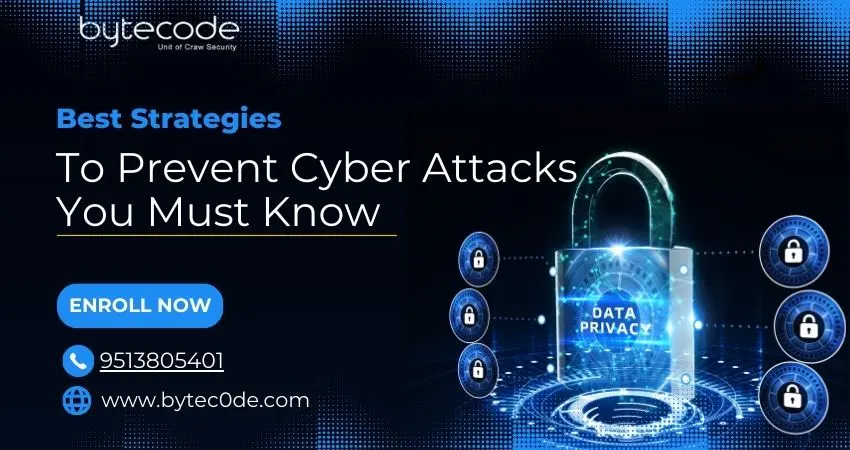Introduction:
Cyber attacks have become an ever-present danger in our digitally interconnected world, with the potential to disrupt our daily lives and jeopardize sensitive data. It is vital to comprehend cyber attacks, including their definitions, common varieties, causes, and potential consequences. Having knowledge of the most best strategies to prevent cyber attacks is of equal significance.
We will examine these subjects and offer an analysis of the most effective cybersecurity solutions for the year 2024 in this article.
Focus Keyword: Strategies to prevent cyber attacks
What is Cyber Attack?
An act of cyber aggression is a malevolent endeavor to exploit weaknesses in computer systems, networks, or devices with the intention of illicitly acquiring information, causing damage, or disrupting operations. A multitude of attack vectors are at one’s disposal, spanning from fraudulent emails and malware infections to Distributed Denial of Service (DDoS) and ransomware, among others.
10 Most Common Types of Cyber Attacks
Here are the 10 Most Common Types of Cyber Attacks:
| Phishing Attacks | Emails and other deceptive communications intended to capture sensitive information. |
| Ransomware | Files of the victim are encrypted by malware that demands payment to be decrypted. |
| DDoS Attacks | Depleting the resources of a system to the point where it is inaccessible to its designated users. |
| Malware | Trojans, worms, and viruses that are specifically engineered to cause harm or seize control of a system. |
| SQL Injection | Malicious code insertion into databases with the intent to take or manipulate data. |
| Zero-Day Exploits | Attacks that target vendor-unknown software vulnerabilities. |
| Man-in-the-Middle (MitM) Attacks | Modifying and intercepting the communication of two parties. |
| Cryptojacking | Utilizing an unauthorized device of another individual to mine cryptocurrencies. |
| Insider Threats | Attempted penetrations originating from present or former personnel. |
| Advanced Persistent Threats (APTs) | Targeted and protracted cyberattacks. |
What are the Causes of Cyber Crime?
The causes of cybercrime are complex, encompassing both technical and human factors. These consist of the following factors:
| Lack of cybersecurity awareness | Insufficient user knowledge regarding cybersecurity leads to unintentional engagement with harmful links or downloading of infected files. |
| Weak security practices | Inadequate security measures, such as the utilization of default passwords or obsolete software, render systems vulnerable to attacks. |
| A high value of digital assets | The substantial worth of digital assets renders firms and individuals attractive targets for hackers. |
| Increasing sophistication of cybercriminals | Cybercriminals are becoming more sophisticated, always devising new techniques to evade security safeguards. |
How Can Cyber Attacks Impact Your Daily Life?
Cyber attacks can have significant consequences on your everyday life, encompassing the following:
- Monetary damage resulting from the misappropriation of banking data or personal identity.
- Mental suffering resulting from the unauthorized disclosure of personal data.
- Interruption of regular activities, particularly if dependent on online services that are compromised.
- Distrust in digital systems can impact your online platform interactions.
Best Strategies To Prevent Cyber Attacks
To mitigate the risk of cyber threats, it is advisable to use the following strategies:
- Consistently ensure that software and systems are updated to rectify any vulnerabilities.
- Employ robust and distinctive passwords and contemplate utilizing a password manager.
- Incorporate multi-factor authentication (MFA) to enhance security by adding an additional layer of protection.
- Acquire knowledge and instruct both yourself and your team on the most effective methods for ensuring cybersecurity, as well as the various techniques employed in phishing schemes.
- To safeguard vital information from ransomware attacks, it is crucial to frequently create backups of data.
- Implement network security protocols, such as firewalls and antivirus software.
- Restrict user access to information and systems based on their assigned roles and necessary requirements.
Best Cybersecurity Solutions To Prevent Cyber Attacks in 2024
It is imperative to implement state-of-the-art cybersecurity solutions in order to bolster your defense mechanisms against cyber assaults. In 2024, contemplate incorporating the subsequent resolutions:
| Cloud-Based Security Platforms | These provide adaptable and versatile security features, such as threat intelligence and live monitoring. |
| AI and Machine Learning-Based Tools | To facilitate predictive threat analysis and identify anomalies, hence aiding in the prevention of potential assaults. |
| Endpoint Security Solutions | In order to safeguard endpoints against a range of potential dangers, it is crucial to guarantee that any devices that connect to your network do not pose a risk to its security. |
| Zero Trust Architecture | An authentication mechanism that enforces rigorous verification of the identification of individuals and devices attempting to get access to resources on a private network, irrespective of their location within or outside the network perimeter. |
| Blockchain for Cybersecurity | Utilizing blockchain technology to improve the reliability and safety of data transfer and retention. |
Wrapping Up
In our verdict, to effectively prevent cyber attacks, a comprehensive strategy is necessary, which involves the integration of education, implementation of best practices, and utilization of advanced technology solutions. Through acquiring knowledge and taking necessary precautions, both individuals and businesses can greatly diminish their susceptibility to cyber risks.
To know more about the same, you can join a fully-fledged 1 Year Cyber Security Diploma Course by Bytecode Security imparted by highly excelled instructors with many years of quality experience. To enquire about the upcoming batches of the same course, give us a call at our hotline mobile number +91-9513805401.

